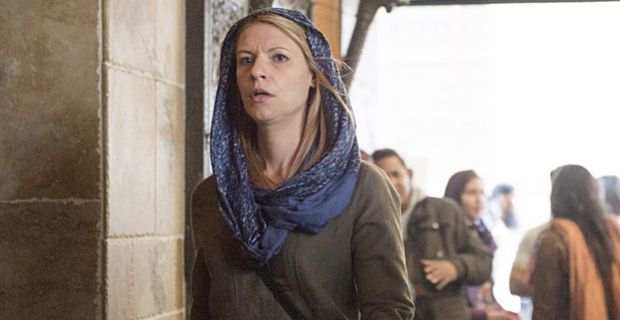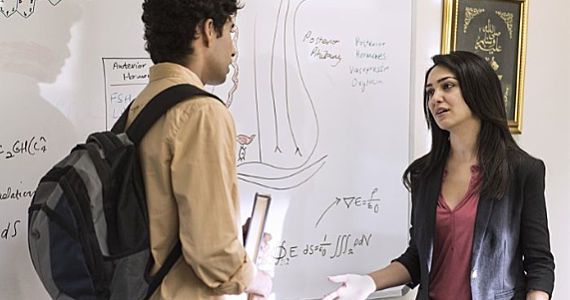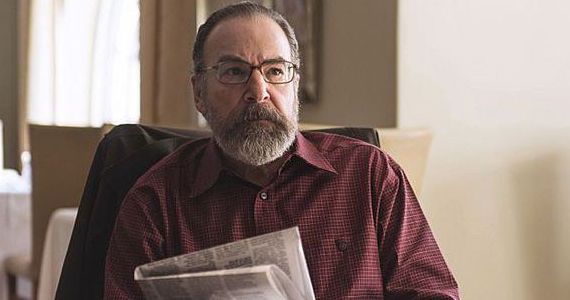[This is a review of Homeland season 4, episode 3. There will be SPOILERS.]
-
Well, after two episodes in one week without the divisive opening credits sequence, Homeland has seen fit to bring it back, albeit in an altered form. The return of the slow, jazzy opening with its sound bites and images is well-timed given much of the episode concerns various characters making their return to a familiar stasis point. That of course comes after the events of 'Trylon and Perisphere,' which, when viewed through the lens of this week's 'Shalwar Kameez,' more or less demonstrated the many ways the core cast members are simply not cut out for domesticity.
There's little or no mention of Carrie's sister or her daughter that she abruptly left behind. It's like the Bizzaro version of Sally Field's Not Without My Daughter. There is also zero indication that she currently is or has been processing the contemplation of drowning her own child. It's only a week (our time) removed from the incident, so it's understandable that Homeland would want to focus on other things, especially now that Carrie's been put in charge of the station in Islamabad, to try and piece together the events that led up to Sandy's death.
And considering she finds herself running into the twin roadblocks of the U.S. Ambassador Martha Boyd and John, Sandy's drunken would-be successor, who makes the mistake of addressing Carrie as "young lady," there's really no opportunity to address Carrie's postpartum depression without grinding what momentum there is to a halt.
While it's great to see Carrie asserting herself so thoroughly after having just arrived, the dressing down she gives John and his rote accusations of sexual impropriety in regard to how she got what he thinks is his job, clearly paints him as the drunken, bullying, misogynist type – something of a trope for this genre.
That's bad enough, but it's augmented by the show's depiction of Carrie, which often undermines her efficacy as a character and the audience's willingness to empathize with her. All of which means guys like John have to be dialed up to 11, just to counterbalance the lingering questions about how Carrie was not on trial for treason, much less being given a series of promotions after what she did in season 3.
On the bright side, Carrie's response, "I asked him nicely," worked out pretty well.
But not everything in Islamabad can be shut down as easily as John, so Carrie has to rely on some unexpected help from Saul, who shows up out of the blue to lend a helping hand with Boyd. There's a lot of team-building going on throughout the episode – with the appearance of Max and Fara (no Virgil, it seems) – and there are some indications that Saul is going to find himself becoming a part of Carrie's unofficial group, but here he is simply a convenient plot device.
Not only does Saul overturn Boyd's campus lockdown, but he also manages to persuade the ambassador to give Carrie another chance, to start over because he's sure they'll really hit it off. Oh, and she casually mentions that she and Saul were once engaged.
There's a whiplash effect with everything happening between Saul and Boyd that's not helped by the fact that it all takes place off screen and without Carrie's input. While it speeds things along, getting the storyline to a place where it can focus on Aayan and Carrie's investigation into Sandy's death, it fails to legitimize Saul's appearance as anything more than a bulldozer to clear a path for Carrie to walk.
Yes, there's a nice exchange between the two where it feels like the teacher is no longer needed by the student and there's whiff of nostalgia in the air, but it lasts about as long as an extra large glass of white wine in Carrie's hands at the end of the day.
Moreover, the reveal of Boyd and Saul's past engagement doesn’t shed any real light on either character, although Boyd's line, "We were young. We were stupid. It was Beirut," is a highlight, even if it's the most Raymond 'Red' Reddington-esque thing anyone outside of The Blacklist has ever said. Instead, the revelation of their past history demonstrates the ways in which international spycraft is apparently a recipe for romance, further justifying Homeland's attempts to force a love story where there is absolutely no need for one.
Aside from the question of why, does anyone really care about Quinn's romantic feelings for Carrie? And why is it something that a CIA psychologist and Dar Adal would see fit to question Quinn about, especially when he's clearly suffering from PTSD and would benefit a great deal more from these people helping him, than from Dar Adal showing up at his apartment to basically ask, "So, do you 'like her' like her, or do you just like her?"
Normally, viewers don’t have a hard time reading romantic subtext into any male/female partnership, but this Carrie-Quinn (Quarrie?) thing is flummoxing at best. Aside from the writers, has anyone been shipping these two?
At any rate, Quinn's feelings get the better of him, as he tells Carrie how she's the hardest person in the world to say no to, like it's a charming hold she has over people and not about how selective her hearing is most of the time. The trouble is, this unseen affection ruins the only interesting relationship the series has going for it at the moment, as Quinn coldly dismisses his apartment manager (who doesn't even get a name, but is played by Emily Walker) in favor of returning to help Carrie.
The plot thickens thanks to YouTube and the world's fastest Internet connection, when Quinn discovers what looks to be a coordinated effort to kill Sandy by Pakistani intelligence. This helps get all the players in the same place, so hopefully the events of next week's episode will help justify the clumsiness seen here.
Homeland continues next Sunday with 'Iron in the Fire' @9pm on Showtime.




